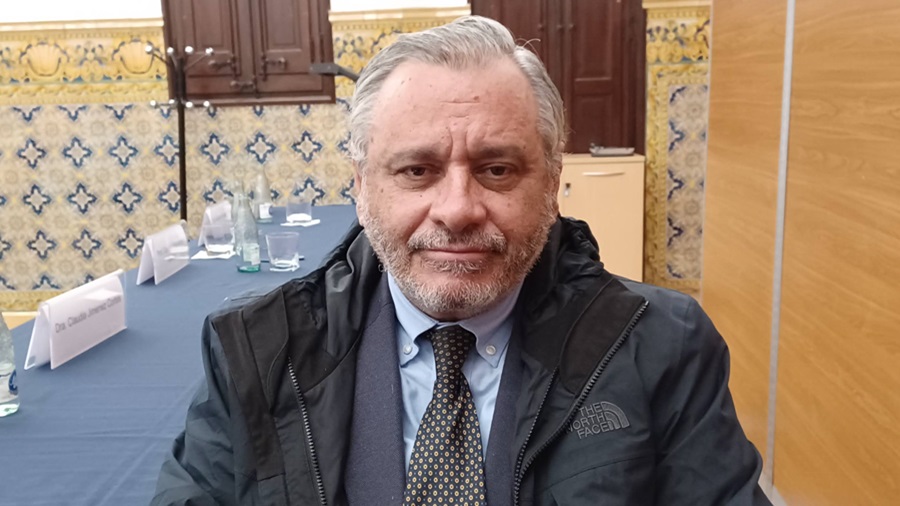Pablo Ruiz-Tagle: "Today it is not possible to think of a total replacement of the Chilean Constitution"
Pablo Ruiz-Tagle, Dean of the Faculty of Law of the University of Chile, participated in the conference on the pros and cons of Chile's constituent process, entitled "El proceso constituyente chileno: fortalezas y prespectivas de futuro", which took place on 23 January at the UAB Casa Convalescència.

Also participating in the conference were lecturers Álvaro Anríquez and Claudio Palavecino, directors of the Department of Legal Sciences and Department of Occupational Law and Social Security of the University of Chile; Clàudia Jiménez, lecturer in International Public Law and International Relations at the UAB, and Jaime Ferraz, General Consule of Chile in Barcelona. The speakers discussed the difficulties of substituting the existing constitution, passed in 1980 under the dictatorship of Augusto Pinochet and subsequently subjected to a multitude of partial reforms: the two drafts of the new constitutional text, presented in 2022 and 2023, were both rejected in referendums. The event was organised by the UAB Department of Public Law and Legal History Studies with the collaboration of the University of Chile.
In your opinion, does the Chilean society want a new constitution?
A sector of Chile, which for now is not the majority, thinks that it would be a good idea to have a new constitution. But there is also a significant sector, perhaps more important and which could reach majority, that thinks it is enough if we make changes to the constitution that we have today. And others want to keep things the way they are or even move more towards right-wing ideas, strengthening aspects which were toned down throughout the democratic process which began in the 1990s. They want to reverse the progress made and copy what has been done under Donald Trump and Jair Bolsonaro, who are both very present here in Latin America.
The deep political division reflected by the rejection of the two drafts is a reflection of the social division in Chile?
I think it is. The division can be seen both politically and in social sectors. And in both left and right-wing parties there are sectors that do not believe in the democratic system: conservatives are influenced by Trump and Bolsonaro, and liberals are influenced by Hugo Chávez amd Nicolás Maduro. Central parties have not had enough energy to convince the Chilean society that we must advance towards democracy. But this is not only a problem in Chile, it exists in all of the region and in the entire world. Today, democracy is in danger, it is weak and in many places there are those who think that authoritarian solutions must be applied. That is why only 8% of the world's countries currently lives in a full democracy.
Is the loss of credibility of the political class what is influencing the impossibility of passing a new constitution?
As lecturer in constitutional law, I do not believe in the impossibility of a constitutional project. But I do think that during a long period of time, we will not see the total substitution of our current constitution. We can aspire to make gradual, specific reforms. The majority of Chileans have voiced a wish to change the system, but they want to do it slowly, with partial reforms. Now it is easier to change the constitution, which is something that was not possible a few years back. And I, since I am a reformist, a Girondist, I believe in a gradual reform.
Would you say that the problem of confirmation bias, which is very damaging in social networks and in communications in general, seems to have contributed to this political polarisation?
This is very true and it is something we did not talk about in the conference. Unfortunately, the world of social networks expresses primitive emotions: joining others that think alike, looking for disqualifications before using critical thinking, etc. Instead of reflecting on something, people look for the voice of a leader who can fill their ego or their tribe, and this weakens democracy. A democracy cannot function with drums and people dancing around a fire; it must have persuasion and deliberation. It must listen to others and decide what parts of their arguments make sense, and be critical about the things we think instead of imposing them or becoming offended when someone else says something that we do not find correct.
Will it be possible to reach a consensus project between the different political and social sensitivities in the coming years?
Absolutely. And I believe there will be constitutional changes during 2024, even if they are small ones. The thing is that these past four years have been very intense. On top of that, we are now at a moment of pause announced by the current government, since it will not make any more changes in the next two years. But, once there are new elections, depending on who is elected, a new partial, gradual, reflective, and a definitely democratic constitutional debate will begin.
The UAB, with Sustainable Development Goals
Peace, justice and strong institutions
Quality education